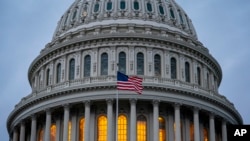ໃນຂະນະທີ່ເຂົາເຈົ້າດຳເນີນການສືບສວນເພື່ອຟ້ອງຮ້ອງດົນສອງເດືອນ ກ່ຽວກັບ ການກະທຳຂອງປະທານາທິບໍດີດໍໂນລ ທຣຳ, ພັກເດໂມແຄຣັດ ໄດ້ພິຈາລະນາຂໍ້ກ່າວຫາຕ່າງໆ ຢ່າງກວ້າງຂວາງຕໍ່ທ່ານ, ລວມທັງ ຂໍ້ກ່າວຫາທີ່ມີຜົນມາຈາກການສືບສວນສອບສວນຂອງໄອຍະການພິເສດທ່ານ ໂຣເບີດ ມັລເລີ ແລະ ການລະເມີດຂໍ້ຫ້າມ ກ່ຽວກັບການຮັບຂອງຂວັນ ໃນລັດຖະທຳມະນູນ ສະຫະລັດ.
ແນວໃດກໍຕາມ, ໃນທີ່ສຸດປະທານສະພາຕ່ຳ ທ່ານນາງ ແນນຊີ ເພໂລຊີ ແລະ ຜູ້ນຳລະດັບສູງຄົນອື່ນໆໃນພັກເດໂມແຄຣັດ ກໍໄດ້ຕົກລົງກັນ ກ່ຽວກັບ ການຕັ້ງຂໍ້ກ່າວຫາສອງຂໍ້ຄື ການລະເມີດຕຳແໜ່ງ ແລະ ການຂັດຂວາງລັດຖະສະພາ.
ໃນການເລືອກທີ່ຈະເຮັດໃຫ້ຂໍ້ກ່າວຫາຕ່າງໆແຄບເຂົ້າແທນທີ່ຈະກວ້າງອອກນັ້ນ, ພັກເດໂມແຄຣັດ ໄດ້ພະຍາຍາມທີ່ຈະສະກັດການວິພາວິຈານຂອງພັກຣີພັບບລີກັນວ່າ ຂະບວນການຟ້ອງຮ້ອງຕໍ່ທ່ານ ທຣຳ ແມ່ນຄວາມພະຍາຍາມ ທີ່ບໍ່ຖືກຕ້ອງຕາມກົດໝາຍ ເພື່ອປົດປະທານາທິບໍດີທີ່ຖືກເລືອກຢ່າງເປັນປະຊາທິປະໄຕອອກຈາກຕຳແໜ່ງ, ອີງຕາມການກ່າວຂອງຜູ້ຊ່ຽວຊານບາງຄົນ.
ທ່ານນາງ ຄິມເບີລີ ເວລີ, ອະດີດຜູ້ຮ່ວມງານການ ໃຫ້ຄຳປຶກສາອິດສະຫຼະ ໃນການສືບສວນສອບສວນ ໄວ້ວໍເທີ (Whitewater) ກ່ຽວກັບ ອະດີດປະທານາທິບໍດີ ບິລ ຄລິນຕັນ, ໄດ້ກ່າວວ່າ ການຕັດສິນໃຈຂອງພັກເດໂມແຄຣັດ ແມ່ນ ການກະທຳທີ່ສະຫຼາດ, ມັນຈະເຮັດໃຫ້ພັກຣີພັບບລີກັນມີຄວາມຫຍຸ້ງຍາກກວ່າເກົ່າ ທີ່ຈະປະຕິເສດການກະທຳໃນປະວັດສາດທັງໝົດ.
ທ່ານນາງ ເວລີ ເຊິ່ງແມ່ນອາຈານສອນກົດໝາຍຢູ່ມະຫາວິທະຍາໄລ ບາລຕິມໍ ໄດ້ກ່າວວ່າ “ຖ້າມັນແມ່ນລາຍຊື່ຊັກເຄື່ອງ ຂອງມາດຕາການຟ້ອງຮ້ອງຕ່າງໆນັ້ນ, ພັກຣີພັບບລີກັນສາມາດເວົ້າໄດ້ວ່າ, ພັກເດໂມແຄຣັດ ແມ່ນບໍ່ສາມາດຄວບຄຸມໄດ້ແລ້ວ. ນີ້ແມ່ນການຊອກຫາຈັບຜິດ ຫຼື ນີ້ແມ່ນການເຮັດເກີນຂອບເຂດ. ແລະ ເຂົາເຈົ້າສາມາດເຊື່ອງຄຳເວົ້ານັ້ນ ເພື່ອຍ່າງໜີຈາກການຟ້ອງຮ້ອງປະທານາທິບໍດີນີ້.”
ມາດຕາການຟ້ອງຮ້ອງແມ່ນຄ້າຍຄືກັນກັບຂໍ້ກ່າວຫາທາງອາຍາ. ມາດຕາສອງຂໍ້ຂອງການຟ້ອງຮ້ອງທີ່ຖືກເປີດເຜີຍໃນວັນອັງຄານວານນີ້ໄດ້ເພັ່ງເລັງໃສ່ ຢູເຄຣນ ແລະ ກ່ຽວຂ້ອງກັບຄວາມພະຍາຍາມຂອງທ່ານ ທຣຳ ເພື່ອເຮັດໃຫ້ ຢູເຄຣນ ສືບສວນອະດີດຮອງປະທານາທິບໍດີ ໂຈ ໄບເດັນ, ເຊິ່ງແມ່ນຄູ່ແຂ່ງທາງການເມືອງ, ແລະ ທິດສະດີທີ່ບໍ່ໜ້າເຊື່ອຖື ກ່ຽວກັບ ຢູເຄຣນ ແຊກແຊງການໂຄສະນາຫາສຽງປະທານາທິບໍດີໃນປີ 2016 ແລະ ຄວາມພະຍາຍາມຂອງທ່ານ ທຣຳ ໃນເວລາຕໍ່ມາ ເພື່ອຂັດຂວາງການສືບສວນຂອງສະພາຕ່ຳ.
ເຖິງວ່າມັນຈະບໍ່ແມ່ນການກະທຳຜິດທາງອາຍາກໍຕາມ, ແຕ່ການລະເມີດອຳນາດແມ່ນຫົວຂໍ້ໄລຍະຍາວ ໃນການຟ້ອງຮ້ອງປະທານາທິບໍດີ, ອີງຕາມທ່ານ ລູອິສ ໄມເກິລ ໄຊດ໌ແມັນ (Louis Michael Seidman), ອາຈານສອນກົດໝາຍລັດຖະທຳມະນູນທີ່ມະຫາວິທະຍາໄລ ຈອຣ໌ຈທາວ. ການຂັດຂວາງລັດຖະສະພາບໍ່ແມ່ນເລື່ອງທີ່ມີທົ່ວໄປ. ທ່ານ ຣິເຈີດ ນິກສັນ ໄດ້ປະເຊີນກັບຂໍ້ກ່າວຫາທີ່ຄ້າຍຄືກັນ ສຳລັບການດູໝິ່ນລັດຖະສະພາ.
ຂໍ້ທີນຶ່ງໄດ້ກ່າວຫາທ່ານ ທຣຳ ກ່ຽວກັບ ການໃຊ້ອຳນາດໃນຕຳແໜ່ງຂອງທ່ານ ເພື່ອຂໍໃຫ້ ຢູເຄຣນ ແຊກແຊງໃນການເລືອກຕັ້ງປະທານາທິບໍດີ ສະຫະລັດ ປີ 2020. ເຂົາເຈົ້າໄດ້ກ່າວຫາວ່າ ປະທານາທິບໍດີ ໄດ້ຂໍໃຫ້ ຢູເຄຣນ ດຳເນີນການສືບສວນທີ່ຈະເປັນຜົນປະໂຫຍດ ຕໍ່ການຖືກເລືອກດຳລົງຕຳແໜ່ງຄືນຂອງທ່ານ, ທຳລາຍຄວາມຫວັງໃນການເລືອກຕັ້ງຂອງຄູ່ແຂ່ງທາງການເມືອງ ແລະ ແຊກແຊງການເລືອກຕັ້ງປະທານາທິບໍດີ ສະຫະລັດ ປີ 2020 ເພື່ອຄວາມໄດ້ປຽບຂອງທ່ານ.”
ເຂົາເຈົ້າເວົ້າວ່າ ທ່ານ ທຣຳ “ໄດ້ພະຍາຍາມກົດດັນ” ຢູເຄຣນ ເພື່ອເອົາບາດກ້າວຕ່າງໆພວກນີ້ ດ້ວຍການຕັ້ງເງື່ອນໄຂເງິນຊ່ວຍເຫຼືອທາງທະຫານ ເກືອບ 400 ລ້ານໂດລາ ແລະ ການພົບໃນທຳນຽບຂາວລະຫວ່າງທ່ານ ທຣຳ ກັບປະທານາທິບໍດີ ຢູເຄຣນ ກ່ຽວກັບ ການສືບສວນສອບສວນ.
ໃນຕະຫຼອດການສືບສວນເພື່ອຟ້ອງຮ້ອງນັ້ນ, ພັກເດໂມແຄຮັດ ໄດ້ພະຍາຍາມທີ່ຈະພິສູດໃຫ້ເຫັນວ່າ ທ່ານ ທຣຳ ໄດ້ທຳການຜັກດັນສຳລັບການສືບສວນສອບສວນ ໃນການແລກປ່ຽນສຳລັບການຊ່ວຍເຫຼືອທາງທະຫານ ແລະ ການປະຊຸມໃນຫ້ອງການປະທານາທິບໍດີ ກັບປະທານາທິບໍດີ ຢູເຄຣນ. ແຕ່ການກຳນົດວ່າເປັນການຊື້ຈ້າງຢ່າງແນ່ນອນນັ້ນ ໄດ້ພິສູດໃຫ້ເຫັນວ່າເປັນສິ່ງທ້າທາຍຫຼາຍກວ່າທີ່ເຂົາເຈົ້າໄດ້ຄາດໝາຍເອົາໄວ້. ນັ້ນອາດອະທິບາຍວ່າ ເປັນຫຍັງການລົງມະຕິດັ່ງກ່າວຈຶ່ງຫຼຸດຄວາມສຳຄັນຂອງການຊື້ຈ້າງ ສຳລັບເຫດຜົນຂອງເຂົາເຈົ້າ.
ມາດຕາຂໍ້ທີສອງ ແມ່ນໄດ້ເພັ່ງເລັງໃສ່ຄວາມພະຍາຍາມຂອງທ່ານ ທຣຳ ເພື່ອຂັດຂວາງການສືບສວນເພື່ອຟ້ອງຮ້ອງຂອງສະພາຕ່ຳ. ຫຼັງຈາກພັກເດໂມແຄຣັດ ໄດ້ປະກາດການສືບສວນດັ່ງກ່າວໃນທ້າຍເດືອນກັນຍາທີ່ຜ່ານມາ, ທ່ານ ທຣຳ ໄດ້ສັ່ງໃຫ້ທຳນຽບຂາວ ແລະ ຝ່າຍບໍລິຫານຕ່າງໆບໍ່ໃຫ້ຮ່ວມມືກັບການສືບສວນນັ້ນ.
ມະຕິດັ່ງກ່າວໄດ້ເວົ້າວ່າ “ໃນປະຫວັດສາດຂອງສາທາລະນະລັດ, ບໍ່ມີປະທານາທິບໍດີຄົນໃດເຄີຍອອກຄຳສັ່ງຂັດຂືນຢ່າງສິ້ນເຊີງ ຕໍ່ການສືບສວນເພື່ອຟ້ອງຮ້ອງ ຫຼື ພະຍາຍາມທີ່ຈະຂັດຂືນຢ່າງຮອບຄອບ ໃນຄວາມສາມາດຂອງສະພາຕ່ຳ ທີ່ຈະສືບສວນຄະດີໃຫຍ່ ແລະ ຄວາມຜິດທາງອາຍາ.”
As they conducted a two-month-long impeachment inquiry into the conduct of President Donald Trump, Democrats considered a range of charges against him, including articles stemming from special counsel Robert Mueller's investigation, and violations of the emoluments clause to the U.S. Constitution.
In the end, however, House Speaker Nancy Pelosi and other top Democratic leaders settled on just two charges: abuse of power and obstruction of Congress.
In opting for a narrow rather than a broad set of charges, Democrats sought to blunt Republican criticism that the impeachment proceeding against Trump is an illegitimate attempt to undo a democratically elected president, according to some experts.
Kimberly Wehle, a former associate independent counsel in the Whitewater investigation of former President Bill Clinton, said the Democrats' decision is a smart play, if only to make it more difficult for Republicans to be totally dismissive of the historic action.
"If it had been a laundry list of articles of impeachment, the Republicans could say, The Democrats are out of control. This is a witch hunt, or this is overreaching.' And they can hide behind that rhetoric to basically walk away from impeaching this president," said Wehle, a law professor at the University of Baltimore.
Articles of impeachment
Articles of impeachment are similar to criminal charges. The two articles of impeachment revealed on Tuesday are focused on Ukraine and are related to Trump's efforts to get Ukraine to investigate former Vice President Joe Biden, a political rival, and a discredited theory about Ukrainian meddling in the 2016 presidential campaign and Trump's subsequent attempt to impede a congressional inquiry.
Though not a criminal offense, abuse of power is a long-running theme in U.S. presidential impeachments, according to Louis Michael Seidman, a professor of constitutional law at Georgetown University. Obstruction of Congress is less common; Richard Nixon faced a similar charge of contempt of Congress.
Article 1
The first article accuses Trump of using the power of his office to solicit Ukrainian interference in the 2020 U.S. presidential election.It alleges that the president asked Ukraine to conduct investigations that would "benefit his reelection, harm the election prospects of a political opponent, and influence the 2020 United States presidential election to his advantage."
It says that Trump "sought to pressure" Ukraine to take these steps by conditioning nearly $400 million in military aid and a White House meeting between Trump and the president of Ukraine on the investigations.
Throughout the impeachment inquiry, Democrats sought to prove that Trump pushed for the investigations in exchange for military aid and an Oval Office meeting with Ukraine's president.But establishing an explicit quid pro quo proved more challenging than they'd anticipated. That may explain why the resolution plays down a quid pro quo in making its case.
Article 2
The second article is centered on Trump's effort to impede the congressional impeachment inquiry. After Democrats announced the investigation in late September, Trump ordered the White House and executive branch agencies not to cooperate with the inquiry.
"In the history of the Republic, no president has ever ordered the complete defiance of an impeachment inquiry or sought to obstruct and impede socomprehensively the ability of the House of Representatives to investigate high crimes and misdemeanors," the resolution states.





